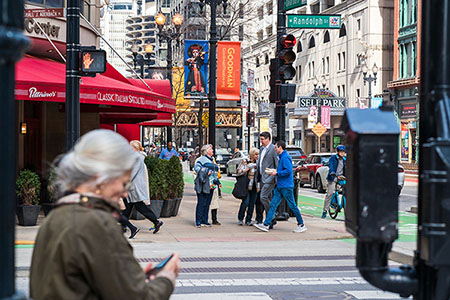River North residents get city to step up to steep curb complaints City acknowledges problems but says there is no money to make curbs ADA compliant 2-Dec-09 – Complaints about steep curbs by River North residents, including residents of Marina City, have inspired the city to investigate what can be done despite limited funding. In September, dozens of corner sidewalks in the River North and nearby neighborhoods of downtown Chicago were torn up and rebuilt to make them comply with the Americans with Disabilities Act. Since 2006, the city has installed shallow ramps at thousands of sidewalk corners. However, some steep curbs remain, most notably in the southwest corner of North Clark Street and West Kinzie Street and the southwest corner of Clark and West Hubbard Street. Marina City residents Carol Minkel and Betty Hogeorges wrote to 42nd Ward Alderman Brendan Reilly earlier in the year, complaining of the steep curbs. Said Minkel about the Clark & Kinzie corner, which is on the most direct path from Marina City to CVS/pharmacy, “it is an absolutely horrendous corner.”
Curbs challenge elderly and disabled Reilly responded to the complaints by writing on August 13 to Chicago Department of Transportation Commissioner Thomas Byrne, requesting inspection and repair of the sidewalks Minkel and Hogeorges noted. Wrote Reilly, “I have recently received residential correspondence [that] these sidewalks are currently not in compliance with ADA standards. As a result, elderly residents and residents that utilize walking aids often have difficulty mounting these sidewalks.” Byrne wrote back to Reilly on September 19, acknowledging the need for ADA compliant ramps at the intersections but saying there was no money to fix them. “The unique conditions at these locations preclude a typical ADA ramp installation,” explained Byrne. “The complex conditions include vaulted sidewalk areas and significant grade differentials between streets, sidewalks and adjacent buildings.” He said the design and construction costs to make the sidewalks ADA compliant would be “significant,” at least $100,000 and possibly hundreds of thousands of dollars. “Currently, such resources are not available to address these matters.” Nonetheless, Byrne then wrote to the The Mayor’s Office of Budget and Management, requesting consideration of funding for future improvement projects. In October, Reilly next wrote to Acting CDOT Commissioner Thomas Powers, who temporarily succeeded Byrne when he was appointed Streets and Sanitation Commissioner. Reilly requested a survey of the southwest corner of Clark and Kinzie, and that it be added to the list of future ramp improvements. “The curbs at this location are very steep,” wrote Reilly. “I have received reports from several residents indicating that they are not able to climb the curbs at this location.” On Wednesday, CDOT spokesperson Brian Steele said he still had not heard of any progress with the Clark & Kinzie sidewalk. “I can tell you that this location, like many others throughout the city, is very challenging,” Steele told Marina City Online. “The level of the curb is significantly higher than the pavement level, construction that likely occurred decades ago. Creating a transition with a grade that meets ADA requirements is a significant construction challenge, much more so than a typical sidewalk corner.” Recent improvements stem from 2005 lawsuit In September 2007, the City of Chicago settled a class action lawsuit by agreeing to spend $50 million over five years to repair and replace curb ramps and sidewalks in high traffic areas, then $18 million per year after that. At any intersection that had been resurfaced – which would include the Clark side of Clark & Kinzie but not the Kinzie side – the city agreed to install new curb ramps, according to the plaintiff’s summary of the settlement, “so that the altered or resurfaced intersections are fully accessible to mobility-impaired persons with disabilities.” The suit had been filed in 2005 by The Council for Disability Rights, which claimed the city had “continuously failed to provide and maintain” curb ramps that were ADA compliant.
|














